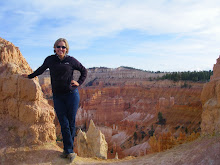Global Warming seems like it’s everywhere these days, on the news and in the papers, scientists, politicians, your neighbors at a potluck, everybody is talking about the earth’s climate changes, and the human activities are causing it. A few years ago, global warming was an if, suddenly, it’s become a when. But still, enjoying a beautiful Ohio summer, it’s easy to ask ourselves, “is it really hotter this year?” “It doesn’t really feel any different from last year.”
Fly a few thousand miles on a direct Delta flight from Cincinnati to Anchorage, Alaska, like I did last month, and suddenly, all those climate change discussions are staring you in the face. Up here, it’s not even when, but right now. I moved up here for a summer conservation job and quickly learned how important Alaska’s environment is to all of us right now, like a canary in a coal mine.
Well, Alaska could probably use a little global warming, people joke. If only it were that simple. Global warming, as we’ve all come to appreciate the term, isn’t really a very accurate description. The climate isn’t simply warming, it’s changing in so many complicated ways that our best scientists can’t hope to model it yet. The best phrase I’ve heard recently was that we’re all facing, and Alaskans now and Ohioans surely soon to follow; a Climate Disruption.
What does that really mean, a climate disruption? Up here, it means that it’s getting warmer, yes, and windier, and stormier along the ocean coasts where sea ice used to offer protection from winter waves before it succumbed to the increasing temperatures and melted. The melting ice is moving away from land, and taking marine mammals like seals, walrus and polar bears away from their critical food supply on the shallow ocean shelf. It’s also taking them away from the subsistence hunters who depend on their flesh to feed their families and their cultures.
The production in the ocean is shifting, so that formerly arctic species like king crab and herring are in rapid decline, and other species, like Walleye Pollock, are reproducing rapidly. Some commercial fisherman are facing the extinction of their industry, others are reeling ‘em in. The distributions, the migrations, the start and end of the seasons, it’s all shifting, and each piece of the puzzle that makes up this ecosystem is shifting just a little bit differently. That’s why we call it a disruption, because when you try to put all the new puzzle pieces back together again, you’re not going to get the same picture.
And why should we care, a 7 hour flight away in Ohio? Not just because the waters that produce more half of the United States’ fish supply are potentially in jeopardy. We’re being motivated by more than just fish sticks here. Alaska might seem far away, but what’s happening there isn’t as removed from us as we’d like it to be. Sure, we don’t have coastal villages at risk of sinking into rising seas or picturesque endangered polar bears to save, but climate disruption is soon to be playing on a climate near you. We can’t be sure yet what forms it will take; hotter, drier, new pests or failing crops, but we can be sure that if we don’t make some serious changes to our fossil fuel consumption, we’ll find out what disruption in Ohio looks like.
So I know that it’s easy to forget about Alaska, to ignore that little bird, while climate change remains a concept and not a consequence in our daily lives, I think it’s important that we make ourselves pay attention to the unpleasant reality at hand. It grows while we ignore it. So now is our time, if not sooner, to do some disrupting of our own, and change the course of carbon dioxide emissions, before our Ohio landscape starts to feel as fragile as it does up here. Consider it a postcard from Alaska.
4 years ago


No comments:
Post a Comment